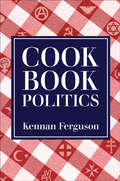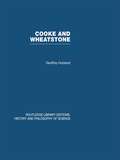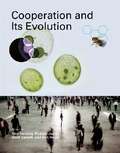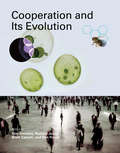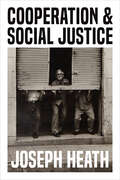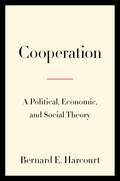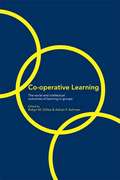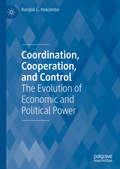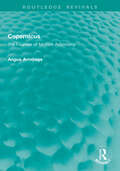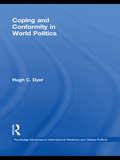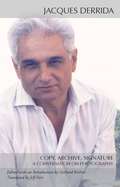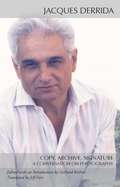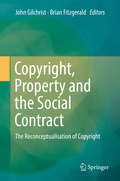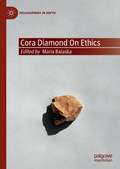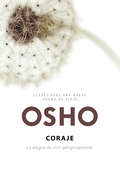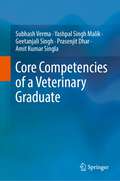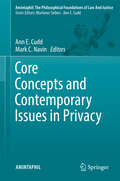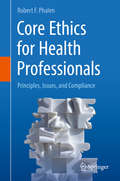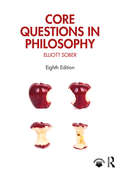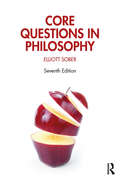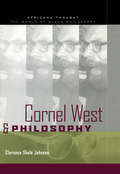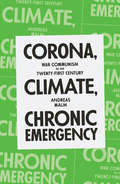- Table View
- List View
Cookbook Politics
by Kennan FergusonAn original and eclectic view of cookbooks as political actsCookbooks are not political in conventional ways. They neither proclaim, as do manifestos, nor do they forbid, as do laws. They do not command agreement, as do arguments, and their stipulations often lack specificity — cook "until browned." Yet, as repositories of human taste, cookbooks transmit specific blends of flavor, texture, and nutrition across space and time. Cookbooks both form and reflect who we are. In Cookbook Politics, Kennan Ferguson explores the sensual and political implications of these repositories, demonstrating how they create nations, establish ideologies, shape international relations, and structure communities.Cookbook Politics argues that cookbooks highlight aspects of our lives we rarely recognize as political—taste, production, domesticity, collectivity, and imagination—and considers the ways in which cookbooks have or do politics, from the most overt to the most subtle. Cookbooks turn regional diversity into national unity, as Pellegrino Artusi's Science in the Kitchen and the Art of Eating Well did for Italy in 1891. Politically affiliated organizations compile and sell cookbooks—for example, the early United Nations published The World's Favorite Recipes. From the First Baptist Church of Midland, Tennessee's community cookbook, to Julia Child's Mastering the Art of French Cooking, to the Italian Futurists' proto-fascist guide to food preparation, Ferguson demonstrates how cookbooks mark desires and reveal social commitments: your table becomes a representation of who you are.Authoritative, yet flexible; collective, yet individualized; cooperative, yet personal—cookbooks invite participation, editing, and transformation. Created to convey flavor and taste across generations, communities, and nations, they enact the continuities and changes of social lives. Their functioning in the name of creativity and preparation—with readers happily consuming them in similar ways—makes cookbooks an exemplary model for democratic politics.
Cooke and Wheatstone: And the Invention of the Electric Telegraph (Routledge Library Editions: History & Philosophy of Science)
by Geoffrey HubbardOriginally published in 1965. Charles Wheatstone collaborated with William Cooke in the invention and early exploitation of the Electric Telegraph. This was the first long distance, faster-than-a-horse messenger. This volume gives an account of the earlier work on which the English invention was founded, and the curious route by which it came to England. It discusses the way in which two such antagonistic men were driven into collaboration and sets out the history of the early telegraph lines, including work on the London and Birmingham Railway and the Great Western Railway.
Cooperation and Its Evolution
by Kim Sterelny Richard Joyce Brett Calcott Ben FraserThis collection reports on the latest research on an increasingly pivotal issue for evolutionary biology: cooperation. The chapters are written from a variety of disciplinary perspectives and utilize research tools that range from empirical survey to conceptual modeling, reflecting the rich diversity of work in the field. They explore a wide taxonomic range, concentrating on bacteria, social insects, and, especially, humans. Part I ("Agents and Environments") investigates the connections of social cooperation in social organizations to the conditions that make cooperation profitable and stable, focusing on the interactions of agent, population, and environment. Part II ("Agents and Mechanisms") focuses on how proximate mechanisms emerge and operate in the evolutionary process and how they shape evolutionary trajectories. Throughout the book, certain themes emerge that demonstrate the ubiquity of questions regarding cooperation in evolutionary biology: the generation and division of the profits of cooperation; transitions in individuality; levels of selection, from gene to organism; and the "human cooperation explosion" that makes our own social behavior particularly puzzling from an evolutionary perspective.
Cooperation and Its Evolution (Life and Mind: Philosophical Issues in Biology and Psychology)
by Kim Sterelny Richard Joyce Brett Calcott Ben FraserEssays from a range of disciplinary perspectives show the central role that cooperation plays in structuring our world.This collection reports on the latest research on an increasingly pivotal issue for evolutionary biology: cooperation. The chapters are written from a variety of disciplinary perspectives and utilize research tools that range from empirical survey to conceptual modeling, reflecting the rich diversity of work in the field. They explore a wide taxonomic range, concentrating on bacteria, social insects, and, especially, humans.Part I ("Agents and Environments") investigates the connections of social cooperation in social organizations to the conditions that make cooperation profitable and stable, focusing on the interactions of agent, population, and environment. Part II ("Agents and Mechanisms") focuses on how proximate mechanisms emerge and operate in the evolutionary process and how they shape evolutionary trajectories. Throughout the book, certain themes emerge that demonstrate the ubiquity of questions regarding cooperation in evolutionary biology: the generation and division of the profits of cooperation; transitions in individuality; levels of selection, from gene to organism; and the "human cooperation explosion" that makes our own social behavior particularly puzzling from an evolutionary perspective.
Cooperation and Social Justice
by Joseph HeathIn six new essays, philosopher and award-winning author Joseph Heath explores the connection between principles of justice and the institutional arrangements required to achieve them. Topics include the significance of status inequality, the question of open borders and immigration, the stigmatization of self-control failure, and debates over racial inequality in the United States. Ultimately, Cooperation and Social Justice reveals that one cannot think about questions of social justice without also taking seriously the institutional arrangements through which they may or may not be realized.
Cooperation: A Political, Economic, and Social Theory
by Bernard E. HarcourtLiberal democracy is in crisis around the world, unable to address pressing problems such as climate change. There is, however, another path—cooperation democracy. From consumer co-ops to credit unions, worker cooperatives to insurance mutuals, nonprofits to mutual aid, countless examples prove that people working together can extend the ideals of participatory democracy and sustainability into every aspect of their lives. These forms of cooperation do not depend on electoral politics. Instead, they harness the longstanding practices and values of cooperatives: self-determination, democratic participation, equity, solidarity, and respect for the environment.Bernard E. Harcourt develops a transformative theory and practice that builds on worldwide models of successful cooperation. He identifies the most promising forms of cooperative initiatives and then distills their lessons into an integrated framework: Coöperism. This is a political theory grounded on recognition of our interdependence. It is an economic theory that can ensure equitable distribution of wealth. Finally, it is a social theory that replaces the punishment paradigm with a cooperation paradigm.A creative work of normative critical theory, Cooperation provides a positive vision for addressing our most urgent challenges today. Harcourt shows that by drawing on the core values of cooperation and the power of people working together, a new world of cooperation democracy is within our grasp.
Cooperative Learning: The Social and Intellectual Outcomes of Learning in Groups
by Robyn M. Gillies Adrian F. AshmanThis book recognizes the importance of cooperative learning, in contrast to the traditional classroom, as an effective approach to learning. Its coverage of the subject ranges across the educational spectrum, from pre-school years to university, and offers a fresh perspective on a topic that has gained increasing interest worldwide.With contributions from an international panel of leading experts in the field, this engaging text succeeds in providing key insights, linking the theories that underpin the study of group dynamics to their practical application in the classroom. It presents a comprehensive overview of this alternative educative approach, illustrating how cooperative learning experiences can promote socialisation and friendships, and facilitate learning. The editors assemble a range of well-researched essays, covering such aspects as:* The importance of teacher and student interaction* Small group, virtual and non-virtual teaching environments* Assessment practices for measuring the outcomes of individual and group progress* The effect of cooperative learning on relationships amongst students with diverse cultural, social and learning needs.Illustrated with practical examples throughout, this book will be a crucial read for teacher educators, educational psychologists, student teachers, academics and researchers who want to realize the significant potential of cooperative learning in all educational settings.
Coordination, Cooperation, and Control: The Evolution of Economic and Political Power
by Randall G. HolcombeThere are two ways people coordinate their actions: through cooperation, exercised by economic power, and through control, exercised by political power. When economic and political power are held by the same people, the result is stagnation; when those who hold economic power are not the same people who hold political power, the result is progress. This book presents the ways in which economic power and political power can be separated, and how they can remain so, by analyzing the nature of power and the differences between economic and political power. The book then discusses the history of economic and political power, including hunter-gatherer societies, agrarian societies, and modern commercial and industrial societies. This background lends insight into why political and economic power were typically held by the same people, and why recently those without political power have been able to acquire economic power. Incentives play a key role in understanding how those two types of power can become separated, and why there is always a tendency for them to recombine. But ideas also play a crucial role, including the influence of the Enlightenment, on the progress that has occurred in the last several hundred years.
Copernicus: The Founder of Modern Astronomy (Routledge Revivals)
by Angus ArmitageCopernicus (1938) presents an account of the astronomer Copernicus, and of the historic book in which he laid the foundations of the heliocentric theory of the planetary motions. The book is of great interest to students of the history of astronomy, and those interested in Copernicus as one of the makers of modern thought.
Coping
by Luc Bovens. Illustrations by Fiorella LavadoCoping is a collection of philosophical essays on how we deal with life’s challenges. We hope for better times, but what is hope, and is it a good thing to hope? How do we look back and make sense of our lives in the face of death? What is the nature of love, and how do we deal with its hardships? What makes for a genuine apology, and is there too much or too little apologizing in this world? Can we bring about changes in ourselves to adapt to our circumstances? How can we make sense of all the good advice—such as, count your blessings, don’t cry over spilled milk—that people have on offer? <p><p> Coping is a perfect companion text for a moral psychology course, a resilience course, or part of an ethics course. The material is written for readers who are new to philosophy and progresses in short self-contained sections. It draws on literature, music, podcasts, and news items. Each chapter has questions for discussion or essay writing and suggestions for material to explore the topic further.
Coping and Conformity in World Politics (Routledge Advances in International Relations and Global Politics)
by Hugh C. DyerConformity is a common coping strategy for dealing with stresses in political situations, as well a strategy for dealing with the lack of agreed foundations. This work introduces the conceptual frameworks of coping and conformity to provide a new analysis of the ethical and political demands of international life. The volume argues that coping through conformity is the only means available for dealing with uncertainty and the absence of shared foundations, and while conformity may be a largely practical issue it also reflects a consensus on values. Dyer draws on recent critical theoretical perspectives as well as engaging with dominant ‘liberal’ assumptions in the global context providing a critical study of the impact of norms and values in world politics. The book also addresses wider issues of freedom and necessity, individualism and communitarianism and cosmopolitanism, agency and structure, and the legitimacy of governance and institutions. The theoretical arguments are illuminated within the ecological context and such recent concerns as climate and energy security are examined as forceful illustrations of current political challenges as well as a potential source of insights into the alternatives. Providing a fresh theoretical perspective on world politics, this work will be of great interest to all scholars of global politics, international relations and globalization studies.
Copy, Archive, Signature: A Conversation on Photography
by Jacques Derrida Jeff Fort Gerhard RichterThis book is based on the interview on the topic of photography that Jacques Derrida granted in 1992 to the German theorist of photography Hubertus von Amelunxen and the German literary and media theorist Michael Wetzel.
Copy, Archive, Signature: A Conversation on Photography
by Jacques Derrida Jeff Fort Gerhard RichterThis book makes available for the first time in English-and for the first time in its entirety in any language-an important yet little-known interview on the topic of photography that Jacques Derrida granted in 1992 to the German theorist of photography Hubertus von Amelunxen and the German literary and media theorist Michael Wetzel. Their conversation addresses, among other things, questions of presence and its manufacture, the technicity of presentation, the volatility of the authorial subject, and the concept of memory. Derrida offers a penetrating intervention with regard to the distinctive nature of photography vis-à-vis related technologies such as cinema, television, and video. Questioning the all-too-facile divides between so-called old and new media, original and reproduction, analog and digital modes of recording and presenting, he provides stimulating insights into the ways in which we think and speak about the photographic image today. Along the way, the discussion fruitfully interrogates the question of photography in relation to such key concepts as copy, archive, and signature. Gerhard Richter introduces the volume with a critical meditation on the relationship between deconstruction and photography by way of the concepts of translation and invention. Copy, Archive, Signature will be of compelling interest to readers in the fields of contemporary European critical thought, photography, aesthetic theory, media studies, and French Studies, as well as those following the singular intellectual trajectory of one the most influential thinkers of our time.
Copyright, Property and the Social Contract: The Reconceptualisation of Copyright
by Brian Fitzgerald John GilchristThis book provides international perspectives on the law of copyright in relation to three core themes - copyright and developing countries; the government and copyright; and technology and the future of copyright. The third theme includes an examination of the extent to which technology will dictate the development of the law, and a re-examination of the role of copyright in fostering innovation and creativity. As a critique, one chapter discusses how certain rights can create or reinforce social inequality under copyright royalty systems. Underlying these themes is the role the law of copyright has in encouraging or impeding human flourishing.
Cora Diamond on Ethics (Philosophers in Depth)
by Maria BalaskaThis collection offers an in-depth look at Cora Diamond’s distinctive approach to ethics and its philosophical significance. It comprises a new essay by Cora Diamond on the policing of concepts, followed by ten original chapters by world-class scholars covering conceptual loss, moral theory, the category of the human, the moral consideration of animals, and the meaning of narcissism. Including comparisons to the work of other contemporary moral philosophers such as Martha Nussbaum, Jeff McMahan, Rai Gaita, Eva Kittay, Christine Korsgaard, and Edward Harcourt, the volume also creates interdisciplinary links between Diamond’s work and other fields of study, including psychoanalysis and contemporary ethology. Showcasing the vital importance of Diamond’s contribution to philosophy, this volume is essential reading for scholars working in ethics, philosophy of language and literature.
Coraje: La alegría de vivir peligrosamente
by Osho OshoCoraje no es la ausencia de miedo, dice Osho. Por el contrario, es la total presencia del miedo y el valor para encararlo. Este libro proporciona una perspectiva general del terreno en el que se originan los miedos, cómo entenderlos, y como encontrar el coraje para encararlos. Osho propone que siempre que nos enfrentemos con la inseguridad y el cambio en nuestras vidas, debemos celebrarlo. Enlugar de aferrarnos a lo familiar y conocido, podemos aprender a disfrutar de estas situaciones como oportunidades para la aventuray para profundizar en nuestra comprensión de nosotros mismos y del mundo que nos rodea.El libro comienza con una exploración en profundidad del significado de la palabra coraje y de cómo se expresa en la vida cotidiana de cada persona. A diferencia de otros libros, que tratan de acciones heroicas de valentía en circunstancias excepcionales, el foco aquí está dirigido a desarrollar el coraje interno que nos permita llevar una vida satisfactoria en cualquier situación. Es el coraje necesario para cambiar, cuando el cambio es necesario, el coraje para defender nuestra propia verdad, incluso en contra de las opiniones de los demás, y el coraje para abrazar lo desconocido.
Core Competencies of a Veterinary Graduate
by Yashpal Singh Malik Subhash Verma Geetanjali Singh Prasenjit Dhar Amit Kumar SinglaThis book is an essential guide for veterinarians, veterinary faculty and policymakers for understanding the core competencies of a fresh veterinarian. The book briefly covers competencies in preclinical, paraclinical, and clinical subjects including anatomy, physiology, biochemistry, veterinary jurisprudence, animal management & welfare including nutrition and breeding, infectious and non-infectious diseases, disease epidemiology, diagnosis, and treatment, prevention, control and zoonoses, surgical and other clinical interventions. The book further includes other competencies, including biologicals, anti-mortem, and post-mortem inspection, certifications, applied one health aspects, review and analysis of scientific evidence, international trade and regulations, and organization of veterinary services. It also highlights the importance of effective communication, interpersonal skills, record keeping and management of a small veterinary hospital, health informatics, etc. The book breakdowns the must-have competencies of a global veterinarian into different topics and subtopics for easy comprehension and further learning. It enables the professional standard-setting & regulatory bodies and academicians in improved curricula designing and implementation and more importantly tries to bring uniformity in day one veterinary graduates’ competencies globally, enhancing the movement and employability of veterinarians across the world.
Core Concepts and Contemporary Issues in Privacy (Amintaphil: The Philosophical Foundations Of Law And Justice Ser. #8)
by Ann E. Cudd Mark C. NavinThis book offers a comprehensive investigation of privacy in the modern world. It collects 16 papers that look at this essential topic from many facets, from the personal to the technological, from the philosophical to the legal. The contributors examine such issues as the value of privacy protection, the violation of spreading personal falsehoods, the digital rights of children, an individual's right to be forgotten from internet search engines, and more.The organization of the volume helps provide a nuanced understanding of this often controversial topic. Coverage starts with key concepts before moving on to explore personal information privacy and the impact of new technologies. Next, the papers consider privacy in different contexts. These include work, sex, family, crime, and religion. This structure enables greater engagement with the difficult questions about privacy. Readers will gain deep insight into the core concepts of privacy as well as its application to everyday life. This interdisciplinary volume brings together an international team of scholars. They provide a broad combination of expertise in law, philosophy, and political science. Overall, this thought-provoking examination will appeal to interested readers in both academia and practice.
Core Ethics for Health Professionals: Principles, Issues, and Compliance
by Robert F. PhalenA timely overview of ethics, emphasizing applications to biomedical researchers, health providers, and administrators There are no simple rules to guide ethical conduct in daily practice, health professionals must have a basic understanding of several topics including ethical theories; ethical scandals; laws, regulations, and institutional policies; and public perceptions. This book can be used for self-study, for classroom instruction, and as a refresher and update by practicing health professionals. The chapters have learning objectives, focused content, a summary of important points, a quiz, and a list of key references. Although the book is arranged in a logical order, each chapter may be studied independently.
Core Questions in Philosophy
by Elliott SoberWrittten in an engaging lecture-style format, this 8th edition of Core Questions in Philosophy shows students how philosophy is best used to evaluate many different kinds of arguments and to construct sound theories. Well-known historical texts are discussed, not as a means to honor the dead or merely to describe what various philosophers have thought but to engage with, criticize, and even improve ideas from the past. In addition—because philosophy cannot function apart from its engagement with the wider society—traditional and contemporary philosophical problems are brought into dialogue with the physical, biological, and social sciences. Text boxes highlight key concepts, and review questions, discussion questions, and a glossary of terms are also included. Core Questions in Philosophy has served as a premier introductory textbook for three decades, with updates to each new edition. Key updates to this 8th edition include: A new chapter, "Probability and Bayes' Theorem" A new explanation of the concept of "soundness," as a useful tool in assessing arguments A clearer explanation, in the chapter on evolution, of the crucial biological idea that the similarities of different species provide evidence of their common ancestry A new discussion of evolutionary altruism in the chapter on psychological egoism A presentation of two interesting arguments from historically important Islamic and Confusian philosophers Improved clarity and updated material from philosophy and empirical research, throughout Revisions to the online list of recommended resources include: Additional recommendations of supplementary readings, with the inclusion of more work from female philosophers New recommended videos and podcasts, all organized by their relevance to each chapter in the book
Core Questions in Philosophy: A Text with Readings (Mythinkinglab Ser.)
by Elliott SoberWriting in an engaging lecture-style format, Elliott Sober shows students how philosophy is best used to evaluate many different kinds of arguments and to construct sound theories. Well-known historical texts are discussed, not as a means to honor the dead or merely to discuss what various philosophers have thought, but to engage with, criticize, and even improve ideas from the past. In addition—because philosophy cannot function apart from its engagement with the wider society—traditional and contemporary philosophical problems are brought into dialogue with the physical, biological, and social sciences. Text boxes highlight key concepts, and review questions, discussion questions, and a glossary of terms are also included. Core Questions in Philosophy has served as a premier introductory textbook for more than two decades, with updates to each new edition. New improvements to this seventh edition include a lower price and a new Routledge companion website that includes: Updated supplementary readings, with the inclusion of more work from female philosophers New videos and podcasts, organized by their relevance to each chapter in the book. Visit the companion website at: www.routledge.com/cw/sober.
Corinthian Wisdom, Stoic Philosophy, and the Ancient Economy
by Timothy A. BrookinsThis work re-examines the divisive wisdom that Paul addresses in 1 Corinthians. Challenging the recent consensus that the Corinthians' wisdom was rooted primarily in the Greco-Roman rhetorical tradition, Timothy A. Brookins offers a revisionary thesis centered on discourse similarities between the perspective of the Corinthian "wise" and the Stoic system of thought. Brookins argues that several members of the church, after hearing Paul's initial gospel message, construed that message in terms of Stoic philosophy and began promoting a kind of "Stoic-Christian" perspective that helped to precipitate divisions in the church. Being apprised of their views, Paul then exploited the "Stoic" discourse of his opponents in order to sustain common discursive ground. In addition to providing a fresh synthesis of the data in 1 Corinthians, Brookins brings in cutting-edge research on the ancient economy as he explores questions related to philosophical education and social status within the church community.
Cornel West and Philosophy (Africana Thought)
by Clarence JohnsonFirst published in 2003. Routledge is an imprint of Taylor & Francis, an informa company.
Corona, Climate, Chronic Emergency: War Communism in the Twenty-First Century
by Andreas MalmWhat does the COVID 19 tell us about the climate breakdown, and what should we do about it?The economic and social impact of the coronavirus pandemic has been unprecedented. Governments have spoken of being at war and find themselves forced to seek new powers in order to maintain social order and prevent the spread of the virus. This is often exercised with the notion that we will return to normal as soon as we can. What if that is not possible? Secondly, if the state can mobilize itself in the face of an invisible foe like this pandemic, it should also be able to confront visible dangers such as climate destruction with equal force. In Corona, Climate, Chronic Emergency, leading environmental thinker, Andreas Malm demands that this war-footing state should be applied on a permanent basis to the ongoing climate front line. He offers proposals on how the climate movement should use this present emergency to make that case. There can be no excuse for inaction any longer.
Corona-Pandemie – die Folgen für die Arbeits- und die Alltagswelt (essentials)
by Irene RaehlmannDas essential thematisiert die Folgen der Corona-Pandemie für die Arbeits- und Alltagswelt. Im Kontext des aktuellen Leitbilds der Gestaltung von Arbeitsorganisationen werden folgende Bereiche der Lebenswelt behandelt: Das Homeoffice und das Homelearning sowie der Wandel der Öffentlichkeit. Das Fazit widmet sich den Folgen für das Wirtschaftssystem, den Problemen wissenschaftlicher Politikberatung, der Digitalisierung von Unterricht und Lehre sowie der Integration der Menschen, aber auch der Gesellschaft insgesamt.
